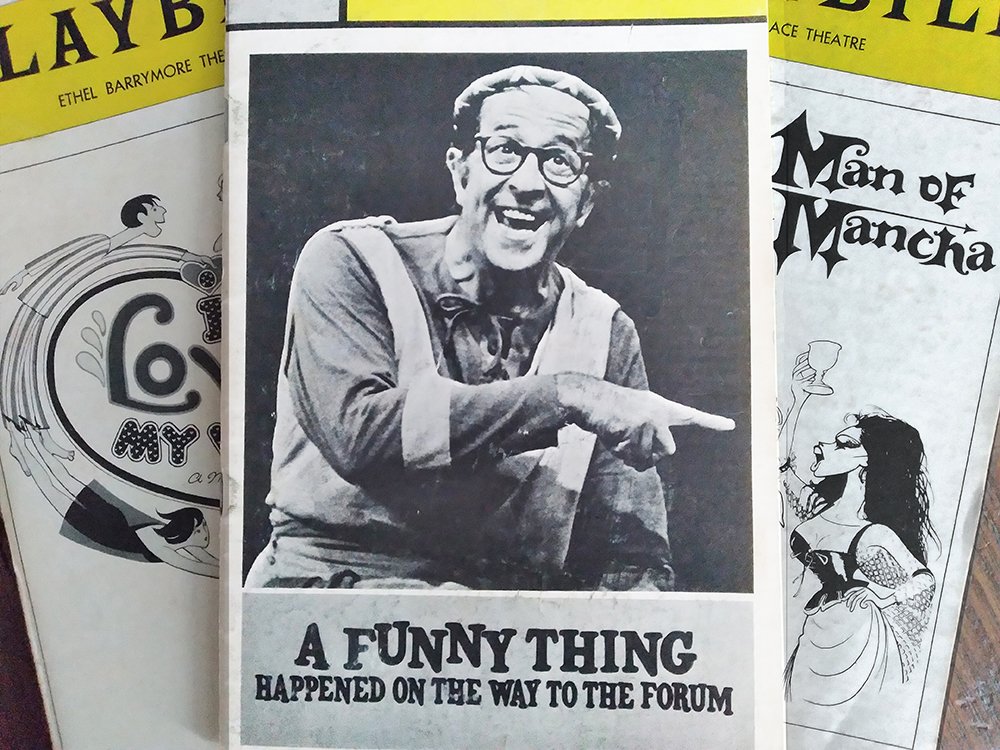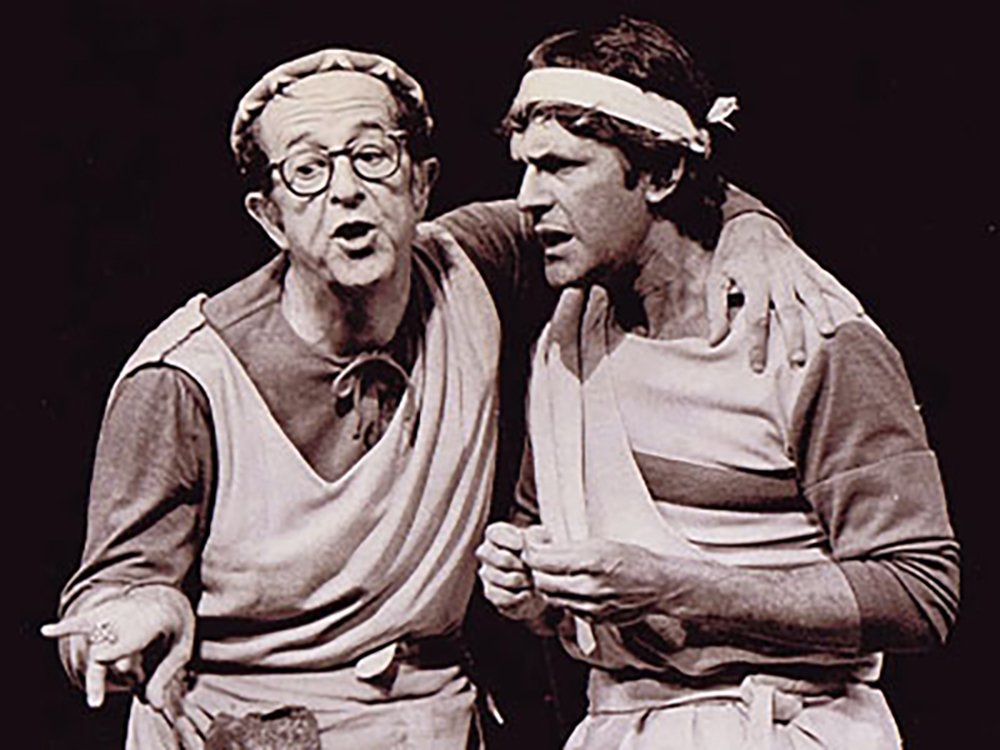"Forum" and the Great Phil Silvers
A Funny Thing Happened on the Way to the Forum holds a special place in my theatre-shaped heart, as it was the first play that I ever produced and directed. During the summer after my sophomore year in college I (along with my friends Morey and David) cast the show and rented the school auditorium in our home town. We asked our high school drama teacher to direct, but he was busy, so he recommended this English teacher, who we didn’t really know. The English teacher ran three rehearsals, and in that time it became clear - even to us teenagers - that he didn’t know how to direct. So we had to fire him. That was an awkward conversation for a 19-year-old to have with a 35-year-old.
Ah, comedy tonight!
But five years before that, in 1972, the very first Broadway show I ever saw was the revival A Funny Thing Happened on the Way to the Forum starring Phil Silvers as Pseudolus.
Silvers was actually offered Pseudolus in the original 1962 production, but turned it down and it famously went to the equally great Zero Mostel. Silvers realized this bad decision only after the show was a hit and he subsequently took a secondary role when it was made into a movie. When asked again in 1972, he accepted the lead role and he ended up winning the Tony - the first time that a performer ever won Best Actor for a revival.
I was 14 at the time and now, that seems late to me to have started seeing Broadway shows. Not only considering that we lived just 45 minutes away, but that my father played violin in the pit of Sweet Charity (with Gwen Verdon), and was a Broadway musician.
Just to set the scene of my growing up and popular culture, there were only three TV networks at the time (ABC, NBC, CBS). And in the New York City area, there were three local stations, WNEW (channel 5), WOR (channel 9), and WPIX (channel 11). The local stations only ran reruns, one of which was The Phil Silvers Show, sometimes known as Sgt. Bilko. Sgt. Bilko was a military sitcom, with Silvers as a fast-talking con man in the army, who uses his outrageous personality and tall tales to get through one scrape or another.
Phil Silvers, center, in Bilko.
Silvers was a natural for Pseudolus, a fast-talking con man in Ancient Rome, who uses his outrageous personality and tall tales to get through one scrape or another. Sgt. Bilko ran from 1956 to 1959, but I probably saw all of the shows in reruns. To an elementary schooler in the 1960s, the shows all seemed current. I also saw Silvers in the 1963 movie It’s a Mad, Mad, Mad, Mad World. Just about every comic actor who was alive in 1963 was in that movie, including Jonathan Winters, Sid Caesar, Jerry Lewis, Milton Berle, Carl Reiner, The Three Stooges, Buster Keaton, Buddy Hackett, Don Knotts, Jimmy Durante and on and on and on. See it if you haven’t.
Silvers in It’s a Mad, Mad, Mad, Mad World.
It might have been just that I was seeing someone who I only saw on television and the movies right in front of me which made it an extraordinary experience. As a kid, that floored me. But there was something else.
Silvers in Top Banana, the Broadway show for which he won his first Tony.
Silvers started as a Vaudeville entertainer. By the time I saw him he had been a performing comedian on stage for 50 years. In Vaudeville if you had just 6 minutes of material, in any genre, you could make a living. And you could do that six minutes for decades, maybe. Vaudeville was THE popular entertainment from the 1870s to the 1930s, when it was finally squashed by the movies. At the height of Vaudeville, there were over 1,200 theatres across the US of all sizes and everybody went, regardless (or irregardless, if you like) of their social status. Vaudeville featured comedians, singers, magicians, dancers, and specialty acts. Abbott and Costello, Josephine Baker, Fred Astaire, Charlie Chaplin, Ella Fitzgerald and Harry Houdini are just a few of the hundreds of well-known performers who got their start in Vaudeville.
Vaudeville poster from 1901
Silvers said that he started as a performer “for the last remaining years that was Vaudeville. It was dying a slow death. I grew up with the tradition you read about. To say to the kids today ‘To play The Palace!’ they don’t know what you’re talking about.”
The Palace Theatre was the premiere Vaudeville house in the 1910s and 1920s. It was converted to a movie theatre in the 1930s and it reopened as a Broadway theatre in 1965. But by that time, Vaudeville was dead.
And when he said the the “kids today don’t know,” he was saying that in 1981. Now they REALLY don’t know.
Silvers moved on to Burlesque when Vaudeville died. A lot of rough characters were in the audience at a burlesque show. it was the epitome of the “tough crowd” for a comic.
Silvers said, “If you made them laugh in Burlesque you were a man, comedy-wise, because they came to see the girls. if you could make those hoodlums laugh, you really were a comedian.”
Silvers as Pseudolus and Larry Blyden (or also produced) as Hysterium.
I distinctly remember Silvers’ first entrance in Forum. He came out from the wings, in a roman tunic, but wearing the thick, black-framed glasses he always wore. He entered laughing, and looking back into the wings, as if he had just been joking with someone offstage when it was time for his cue. I hadn’t seen a lot of plays, but this was not how I expected anyone to make a first entrance. The audience applauded him, but he didn’t take the applause, he was still finishing his offstage interaction. He was so relaxed, and not even aware of us at first. It didn’t even seem it was like he was coming out to do a play. And then he looked at us and seamlessly started the show:
“Playgoers I bid you welcome. The theatre is a temple, and we are here to worship the gods of comedy and tragedy! Tonight, I am pleased to announce - a comedy!”
And the show was off and running.
Carl Ballantine
The show also Featured Carl Ballentine as Marcus Lycus (if you know the show), and Ballantine was a comedy magician in Vaudeville. Ballentine’s shtick was doing magic tricks which never worked. As a kid, I knew him from the iconic TV sitcom McHale’s Navy. It is said that he invented comedy magic.
Forum, which I think is a great musical with a brilliant script, is really just an excuse to for world-class comedians to do what they do best.
In the published script of Forum is an author’s note by Larry Gebart and Burt Shevelove:
“This is a scenario for vaudevillians. There are many details omitted from the script. They are part of any comedian’s bag of tricks: the double take, the mad walk, the sighs, the smirks, the stammerings. All these and more are intended to be supplied by the actor and you, the reader.”
Carl Ballantine, Larry Blyden, unidentified actor as Senex, and Phil Silvers
Seeing these great Vaudeville performers in the context of this show was a window to another world, and in a way was a living museum.
There are many institutions devoted in part to keeping Vaudeville alive, most notably Celebration Barn Theater in South Paris, Maine and Dell-Arte International in Blue Lake, California. Although the historic vaudeville is gone, thank goodness - and these great institutions - that its traditions are being passed down. And many talented performers are now keeping the torch lit.
Silvers had said on more than one occasion that he was not articulate about what he did, how he did it, and what made it funny. But he did say this in a live interview:
“I’ve always been Bilko in everything I did. It’s just that in Bilko, I wore a uniform. I can’t begin to say that I know my art and discuss it. It’s instinctive.” Then he paused, thought for a moment, and went on. “When I’m saying something on the stage, even the most ridiculous thing, I believe it.”








